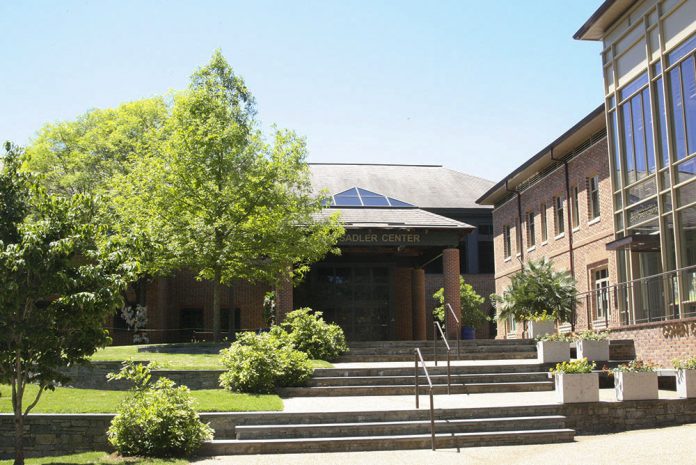Lea DeLaria, who played Big Boo in Netflix’s “Orange is the New Black,” performed stand-up comedy and answered questions in the Sadler Center’s Commonwealth Auditorium Wednesday, Oct. 2. Clad in a green suit and a t-shirt that read “The Lesbians Are Coming,” DeLaria covered LGTBQ+ rights, detailed her life as a self-described “butch” woman and discussed the current political climate in the United States.
In addition to her role on the Netflix show, DeLaria was the first openly gay comedian to perform on American television and has won awards for her roles in television programs, films and both on and off-Broadway plays. She is an accomplished jazz musician with six critically acclaimed records and has sung in many major concert halls throughout the world.
The event opened with an introduction outlining the importance of October as LGBT History Month. The introduction also highlighted the collaboration between the Center for Student Diversity and AMP in hosting and creating the event, which aimed to support the LGBTQ+ community and spread a message of belonging throughout the College of William and Mary’s community.
As a woman with a long history of advocating for LGBTQ+ rights, DeLaria’s performance was centered on self-acceptance and support.
“You do not have to apologize to anyone in this world for who you are or what you think, and you do not have to kowtow to the norms that other people have created… let them do them, and you be you,” DeLaria said.
“You do not have to apologize to anyone in this world for who you are or what you think, and you do not have to kowtow to the norms that other people have created… let them do them, and you be you,” DeLaria said.
DeLaria was involved in the Pride Marches of 1979, 1986 and 1993, both as an attendee and host. She discussed growing up in a time where homosexuality was illegal and referenced her two arrests for open homosexuality.
The major theme of DeLaria’s set was terminology. She addressed her choice to use the word “queer” to describe the LGBTQ+ community, stating that to use the acronym, which she dubbed “alphabet soup,” highlights the differences between community members rather than illustrating the unity in their shared oppression.
She discussed how using the word “gay” rather than “homosexual” in the 1960s and ’70s was an initial act of fighting “the Man,” and how the reclamation of other typically derogatory terms following the AIDS crisis both created rifts within the community and empowered members who identified with such terms. DeLaria also revealed that many people accidentally address her as a man, and showed how she uses humor how to deal with being misgendered.
“My gender-preferred pronoun is Empress,” DeLaria said.
Avery Freeman ’22, who wore an “Orange is the New Black” shirt to the event, appreciated how DeLaria’s performance discussed intersectionality and unity.
“Hearing her experiences firsthand made me grateful to see where we came from,” Freeman said. “I think the message that she drove home about using queer instead of LGTBQ+, especially now, as a more holistic and intersectional approach to being able to come together, was important. We all need to stick together.”
DeLaria ended her set by acknowledging the tremendous amount of progress that the world has made in relation to the acceptance of the LGTBQ+ community over the past thirty years. DeLaria had a message for the audience about the path forward for the community.
“I’ve been here before and seen this before, and if we come together, we can fix anything we want, we can change the world,” DeLaria said. “I’ve seen it happen and I’ve done it myself. I know it can be done.”
DeLaria also received a question on how to deal with differences both within and with those outside of the LGTBQ+ community.
“I recognize people’s differences, yet I don’t consume myself with it,” DeLaria said. “There’s more to you than the color of your skin or the class, or whatever. I’m more concerned about the individual, and you’re part of my family, and if you identify as queer, then you’re definitely part of my family.”
“I recognize people’s differences, yet I don’t consume myself with it,” DeLaria said. “There’s more to you than the color of your skin or the class, or whatever. I’m more concerned about the individual, and you’re part of my family, and if you identify as queer, then you’re definitely part of my family.”
DeLaria stressed her view that the LGTBQ+ community should come together in order to make progress, and exercise patience both with each other and with those outside the community.
Another student asked how students can be activists in their daily lives.
“You can do that just by being yourself, every second…,” DeLaria said. “One must always look evil in the face and call it ‘evil.’ All I mean by that is don’t just stand there when someone says something racist or homophobic or sexist.”
DeLaria also had a message for allies of the community.
“Once in a while, all we need is a hug,” DeLaria said. “I’m not kidding. Just your love and your support and knowing you’re there is very cool to me.”
Laura Schwartz ’20 enjoyed how nuanced DeLaria’s set was, as it balanced humor while also addressing difficult social experiences.
“I really felt like it was genuine and candid,” Schwartz said. “She was really authentically herself but also managed to find nuance between difficult experiences but also find the light at the end of the tunnel and the humor in it.”




































